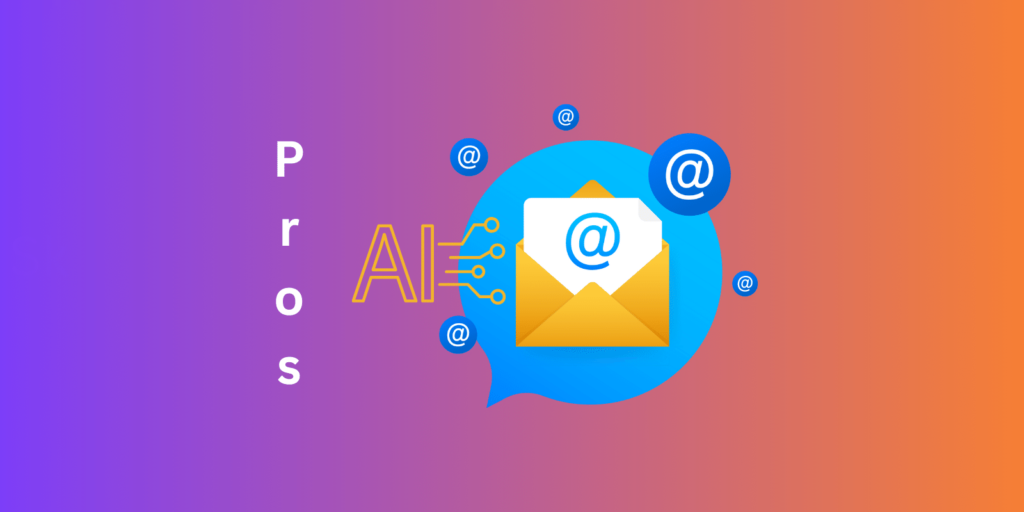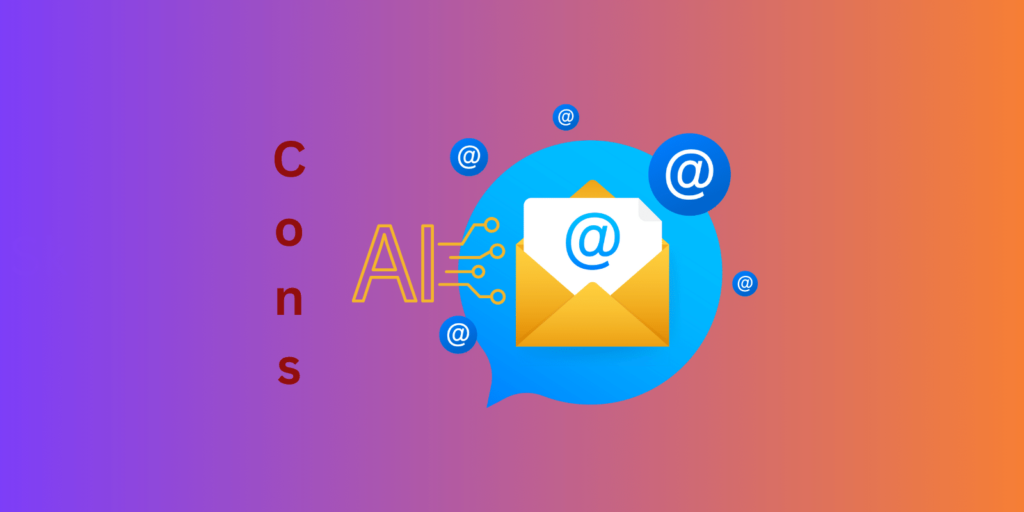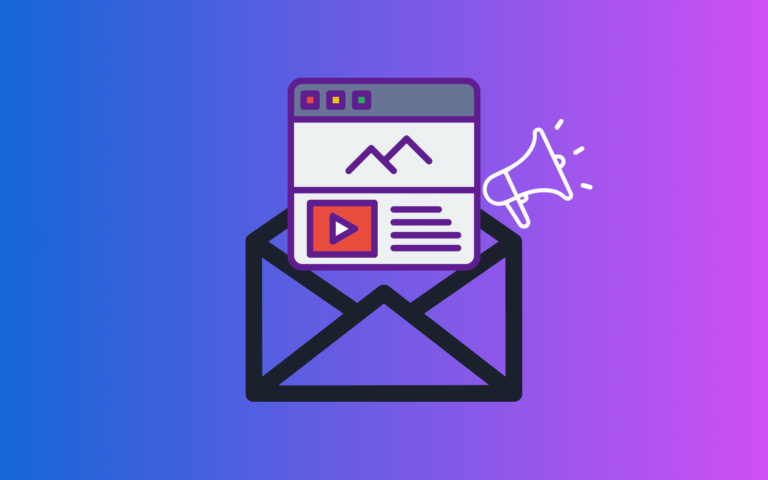AI-Powered Email Marketing Tools Pros and Cons: Deep Dive

AI-powered email marketing tools are changing how we connect with customers. They use data to make campaigns smarter, automate repetitive tasks, and send personalized messages. But, like any technology, they have their ups and downs. Are they a big help, or do they bring challenges?
This blog explores the good and the bad of these tools. We’ll look at what they can do, see them in action through case studies, and discuss how to use them effectively. We’ll also think about what’s next for AI in email marketing. Let’s dive into the AI-Powered Email Marketing Tools Pros and Cons.
Key Takeaways
AI-powered email marketing tools enhance engagement through increased personalization.
These tools save time by automating tasks such as drafting and sending emails.
AI-powered analytics provide valuable insights that can improve email campaign effectiveness.
However, there are concerns about the lack of human touch, data privacy, and the high initial investment required for AI email marketing tools.
Introduction to AI-Powered Email Marketing Tools

Get ready to revolutionize your email marketing strategy with AI-powered tools. AI-powered email marketing tools have become an essential component of modern marketing strategies.
These tools leverage artificial intelligence to analyze customer behavior and optimize email marketing campaigns. By using AI tools, you can gain valuable insights from customer data, allowing you to create personalized and targeted email campaigns.
One of the main advantages of using AI-powered email marketing tools is their ability to analyze vast amounts of customer data. With AI, you can easily track and analyze customer behavior, preferences, and purchase history. This data can create highly targeted email campaigns that resonate with your audience.
Another benefit of AI-powered tools is automation. Automating email marketing campaigns with AI involves audience segmentation, personalized content creation, and scheduling email delivery. This saves you time and effort and ensures your emails are sent optimally for maximum engagement.
However, it’s important to consider the potential downsides of AI-powered email marketing tools. One potential drawback is the reliance on technology. While AI can provide valuable insights, it’s still important to understand the technology’s limitations and not solely rely on it for decision-making.
Pros of Using AI Email Marketing Tools

Using AI email marketing tools has several advantages that can benefit your marketing efforts.
Firstly, these tools allow for increased personalization, helping you tailor your emails to individual recipients and increase engagement.
Secondly, AI tools can help you draft and send emails faster, saving time and effort.
Lastly, AI-powered analytics provide valuable insights into the performance of your email campaigns, allowing you to make data-driven decisions and optimize your marketing strategies.
Increased Personalization
Using AI email marketing tools can greatly enhance the personalization of your email campaigns. By analyzing customer behavior and engagement, these tools provide valuable insights into your audience’s preferences and interests.
With AI marketing, you can create personalized subject lines that grab customers’ attention and increase open rates. By tailoring your content to individual preferences, you can improve customer satisfaction and drive higher engagement.
AI-powered tools also enable you to deliver personalized customer experiences by segmenting your audience and sending targeted emails based on their needs and interests.
This level of personalization increases the effectiveness of your email campaigns and helps you build stronger relationships with your customers, leading to higher conversion rates and improved customer loyalty.
Faster Drafting and Sending
With AI email marketing tools, you can draft and send emails faster. These tools save time and help you streamline your email marketing strategies. Instead of manually crafting each email, you can rely on AI-powered email platforms to automate the process.
By utilizing automated emails, you can set up a series of pre-designed templates to send out to your subscribers at predetermined intervals. This allows you to focus on other aspects of your email campaigns while maintaining consistent communication with your audience.
Furthermore, AI tools provide real-time insights into email performance, allowing you to make data-driven decisions and optimize your email campaigns for better results. With AI, you can deliver personalized campaigns efficiently and effectively.
Improved Analytics
AI Email Marketing Tools offer enhanced analytics capabilities. These tools allow you to gain valuable insights into the performance of your email campaigns. AI-powered tools make data analysis more efficient and accurate, providing you with a deeper understanding of your email marketing efforts.
These AI systems can process large amounts of data quickly. This enables you to identify trends, patterns, and customer preferences. By leveraging predictive analytics, AI tools can help you optimize your marketing strategy. They can suggest the best time to send emails, the most effective subject lines, and personalized content for each recipient.
This level of artificial intelligence marketing empowers you to make data-driven decisions. It also helps you improve customer engagement and achieve better results in your email marketing campaigns.
Cons of Using AI Email Marketing Tools

There are a few drawbacks to consider when using AI email marketing tools.
One of the main cons is the lack of human touch in the communication, which can make the emails feel impersonal and robotic.
Additionally, there are concerns about data privacy, as AI tools may collect and analyze user data.
Lastly, implementing AI email marketing tools can require a high initial investment, which may not be feasible for all businesses.
Lack of Human Touch
Although AI email marketing tools offer automation and efficiency, they often lack the personal touch that human interaction brings to email campaigns. The human touch is essential in creating meaningful customer interactions and enhancing the overall customer experience.
While AI-powered tools can analyze customer behaviors and make data-driven decisions, they may struggle to understand the nuances of individual preferences and emotions.
Email communication is a crucial channel for businesses to connect with their customers, and without the human touch, establishing genuine relationships becomes challenging.
Customers appreciate personalized and tailor-made messages that resonate with their needs and desires. By relying solely on AI, businesses risk losing that personal connection and may fail to deliver the level of engagement that customers expect.
Businesses must find the right balance between automation and human interaction to create successful email campaigns.
Data Privacy Concerns
Using AI email marketing tools can raise concerns about data privacy. As the marketing team, you must consider the potential risks of using AI-powered campaigns. While these tools offer automation and efficiency, they rely on AI algorithms to analyze data and make decisions.
The AI tool could access sensitive customer information like email addresses and purchase history. The marketing campaigns created by AI may also require access to your customer database, which raises further concerns about data security.
Ensuring the AI tool adheres to strict data privacy regulations and protocols to protect customer information. Regular audits, encryption, and secure storage can help mitigate these concerns and ensure the privacy and security of your customer data.
High Initial Investment
While data privacy concerns are important, another drawback of using AI email marketing tools is the high initial investment required. Implementing AI marketing tools can be costly, as it involves acquiring the necessary hardware, software, and infrastructure to support the technology.
Additionally, training staff on effectively using these tools and integrating them into existing digital marketing strategies and advertising campaigns can incur additional expenses.
However, despite the high upfront costs, AI technologies, such as machine learning algorithms, can provide significant competitive advantages in email marketing.
These tools can automate various tasks, such as segmenting audiences, personalizing content, and optimizing the timing and frequency of emails, resulting in higher engagement rates and improved conversion rates for your marketing campaign.
Therefore, while the initial investment may be substantial, the long-term benefits of using AI email marketing tools can outweigh the costs.
Key Capabilities of AI Email Tools

Let’s now explore the key capabilities of AI email tools.
These tools leverage natural language generation to create personalized and engaging email content.
They also utilize predictive analytics to analyze customer data and optimize email campaigns for better results.
Additionally, AI email tools offer A/B testing capabilities, allowing you to test different variations of your emails to determine the most effective approach.
Natural Language Generation
Natural Language Generation is a powerful AI email tool capability that allows you to effortlessly create engaging and personalized content for your email marketing campaigns. With the help of an AI system powered by artificial intelligence and machine learning, you can generate content that resonates with your audience.
AI-generated content considers customer preferences, behavior, and previous interactions to deliver relevant and targeted messages. This technology provides reliable insights into what words, phrases, and tone of voice will yield the best results.
Predictive Analytics
Predictive analytics is a powerful capability of AI email tools that allows you to anticipate customer behavior and tailor your email marketing campaigns for maximum effectiveness.
Predictive analytics can help you analyze data from past interactions and customer preferences to understand what content resonates with your audience and optimize your campaigns accordingly.
This capability enables you to automate tasks such as segmenting your audience and personalizing your emails based on individual characteristics and behaviors. With predictive analytics, you can create more targeted and relevant content that increases engagement and conversions.
However, it’s important to note that predictive analytics isn’t foolproof and may not always accurately predict customer behavior. It also requires a significant amount of data to generate meaningful insights. Predictive analytics can greatly enhance your email marketing efforts when used correctly.
A/B Testing
One key capability of AI email tools is A/B testing, which allows you to experiment with different variations of your emails to determine the most effective strategies for engaging your audience.
A/B testing is a valuable tool for email marketing. It helps you understand what works best for your specific audience. By testing elements such as subject lines, content, and call-to-action buttons, you can optimize your marketing efforts and improve your email campaigns.
Digital marketing experts recommend conducting A/B tests regularly to gather data and make informed decisions. Through A/B testing, you can refine your keyword research and understand which keywords resonate with your audience.
However, it’s important to note that A/B testing can be time-consuming and requires careful planning to ensure accurate results.
Case Studies of AI Email Tools

Now, let’s look at some case studies of AI email tools.
Mailchimp, Persado, and Phrasee are three popular examples that have demonstrated the effectiveness of AI in improving email marketing campaigns.
Various businesses have used these tools to enhance subject lines, optimize content, and personalize emails.
These AI tools have increased open rates, click-through rates, and conversions.
Mailchimp
Now, look at Mailchimp’s capabilities and some use cases where it excels.
Mailchimp offers comprehensive features, including email automation, customizable templates, and advanced analytics.
Whether a small business owner or a marketing professional, Mailchimp can help you streamline your email marketing campaigns and achieve better results.
Capabilities Overview
Mailchimp, an AI email tool, showcases its capabilities through various case studies.
By implementing AI, Mailchimp can create highly targeted email campaigns, enabling businesses to reach specific audience segments with personalized content.
AI also helps analyze vast customer data, allowing businesses to gain valuable insights and make data-driven decisions.
With AI automating repetitive tasks, Mailchimp saves businesses time and resources, empowering them to focus on other important aspects of their marketing strategy.
Use Cases
By showcasing its capabilities through various case studies, Mailchimp demonstrates the practical use cases of AI email tools.
With AI-powered email marketing tools, you can create more effective personalized content for your target audience. These tools automate manual marketing tasks, such as segmenting your audience and analyzing campaign performance.
Persado
Now, let’s talk about Persado, an AI email tool with impressive capabilities.
This platform offers an overview of its capabilities, allowing you to understand how it can benefit your email marketing campaigns.
Additionally, Persado provides numerous use cases, giving you real-world examples of how businesses have successfully utilized their AI technology in their email marketing strategies.
Capabilities Overview
Persado’s AI email tools offer a comprehensive and data-driven approach to optimizing email marketing campaigns. These marketing tools utilize AI technology to analyze the performance of your email campaigns and provide insights for improvement.
By leveraging search engine marketing data and analyzing how search engines work, Persado’s tools can help you better understand your audience’s preferences and behaviors. This allows you to create more personalized and engaging email content that mimics human interaction.
Persado’s tools can also analyze competitors’ websites to identify best practices and enhance your email marketing strategies.
Use Cases
To demonstrate the effectiveness of AI email tools like Persado, let’s explore some real-world case studies showcasing their impact on email marketing campaigns.
One case study involved a global e-commerce company that used Persado’s AI platform to optimize its email subject lines. The results were impressive, with a 22% increase in open rates and a 15% increase in click-through rates.
Another case study featured a financial services firm that saw a 35% increase in engagement using Persado’s AI-powered content recommendations.
Phrasee
Let’s discuss Phrasee, another AI tool that can help enhance your email marketing efforts.
Phrasee offers a range of capabilities, including subject line optimization and email copy generation.
With Phrasee, you can improve the performance of your email campaigns by creating engaging and personalized content that resonates with your audience.
Capabilities Overview
One popular AI email tool that has been extensively studied for its capabilities is Phrasee.
Phrasee uses artificial intelligence to generate and optimize email subject lines and copy. It analyzes data from previous successful campaigns to create compelling and personalized content.
Using natural language processing and machine learning algorithms, Phrasee can improve email open rates, click-through rates, and overall engagement.
Its powerful capabilities make it a valuable tool for email marketers looking to enhance their campaigns and drive better results.
Use Cases
Phrasee, an AI email tool, has been the subject of numerous case studies showcasing its effectiveness in improving email marketing campaigns.
For example, a case study conducted by Virgin Holidays found that using Phrasee’s AI technology resulted in a 2.3% increase in open rates and a 3.2% increase in click-through rates.
Another case study by Domino’s Pizza showed that Phrasee’s AI-generated subject lines increased email revenue by 2.3%.
These case studies demonstrate the real-world impact and potential of AI email tools like Phrasee.
Best Practices for Implementation

When implementing email marketing tools, starting small and testing extensively is important.
Select a few key workflows to focus on and optimize before expanding to larger campaigns.
This approach lets you identify any issues or areas for improvement early on, ensuring that your email marketing efforts are effective and efficient.
Start Small
To successfully implement email marketing tools, it’s recommended to start small and gradually expand your efforts. Starting small allows you to test the waters and identify what works best for your audience.
Begin by segmenting your email list and sending targeted campaigns to specific groups. This approach enables you to personalize your messages and improve engagement rates.
As you gather data and analyze the results, you can make informed decisions on optimizing your email marketing strategy. By starting small, you can avoid overwhelming yourself or your team with a large-scale implementation.
It allows you to refine your approach, test different tactics, and learn from mistakes or challenges. Remember, slow and steady wins the race when implementing email marketing tools.
Test Extensively
Before implementing email marketing tools, it’s crucial to extensively test different strategies and tactics to ensure optimal results. Testing allows you to understand what works best for your audience and enables you to make data-driven decisions.
Start by testing different subject lines, email formats, and call-to-action buttons to determine which elements resonate most with your subscribers. Additionally, conduct A/B tests to compare different versions of your emails and identify the most effective content, design, and timing.
Segmenting your audience and testing personalized content is essential to deliver tailored messages that resonate better with specific groups.
Focus on Workflows
Implement workflows effectively to streamline your email marketing processes and maximize efficiency. Workflows are a series of automated actions triggered by specific events or conditions. By defining and implementing workflows, you can automate repetitive tasks, save time, and ensure consistent communication with your subscribers.
Start by mapping out your email marketing processes and identifying areas where automation can be beneficial. For example, you can create a workflow to automatically send a welcome email to new subscribers, followed by a series of nurturing emails over a specific period.
Additionally, workflows can segment your audience based on their behavior or preferences, allowing you to deliver targeted, personalized content. Review and optimize your workflows to ensure they align with your marketing goals and deliver the desired results.
The Future of AI Email Marketing Tools

As the future of AI email marketing tools continues to evolve, several key points must be considered.
First, there will be continued advancements in AI technology, allowing for more sophisticated and personalized email marketing campaigns.
However, ethical considerations must also be considered, as AI raises questions about privacy and data usage.
Lastly, it’s important to remember that despite the rise of AI, the human element shouldn’t be overlooked, as personal connections and genuine interactions are still crucial in successful email marketing.
Continued Advancements
The future of AI email marketing tools holds great promise for improving customer engagement and increasing conversion rates. Continued advancements in AI technology will enable marketers to personalize email campaigns even further, delivering highly targeted content to individual customers based on their preferences and behavior.
By analyzing vast amounts of data, AI algorithms can identify patterns and predict customer behavior, allowing marketers to send emails at the optimal time for maximum impact. AI-powered tools can also help automate email content creation and optimization, saving marketers time and resources.
Additionally, AI can assist in analyzing campaign performance and providing actionable insights to improve future campaigns. With continued advancements, AI email marketing tools will continue to revolutionize how businesses engage with their customers, leading to more effective and profitable campaigns.
Ethical Considerations
Considerations surrounding the ethical implications of AI email marketing tools in the future are essential for ensuring responsible and respectful customer engagement. As technology advances, the potential for misuse and unethical practices becomes a concern.
One major ethical consideration is privacy. AI email marketing tools can collect and analyze vast amounts of customer data, raising questions about consent and security. Establishing clear guidelines and regulations to protect customer privacy and ensure transparency in data usage is crucial.
Another ethical concern is the potential for AI to manipulate and deceive customers. While AI can personalize and optimize email content, there’s a fine line between customization and manipulation. Striking a balance between effective marketing strategies and ethical practices is crucial to maintaining customer trust and credibility.
The Human Element
To fully grasp the potential of AI email marketing tools, it’s essential to understand the impact of the human element in shaping the future of customer engagement.
While AI can automate and optimize various aspects of email marketing, it can’t replicate the unique qualities that humans bring to the table. The human element encompasses creativity, empathy, and intuition, crucial in building meaningful customer relationships.
AI can analyze data and make predictions, but humans can interpret and understand customers’ emotions and needs. By combining AI’s analytical capabilities with the human touch, businesses can create personalized and compelling email campaigns that resonate with their audience.
The future of AI email marketing tools lies in harnessing the power of both technology and human expertise to deliver exceptional customer experiences.
Summary
In conclusion, AI-powered email marketing tools offer numerous advantages, such as improved personalization, increased efficiency, and enhanced customer engagement. However, they also have drawbacks like errors and over-reliance on technology.
Despite these cons, the key capabilities of AI email tools, including automated segmentation and predictive analytics, make them invaluable for marketers.
By implementing best practices and staying updated with advancements, businesses can harness the full potential of AI email marketing tools and stay ahead in the ever-evolving digital landscape.
FAQ – AI-Powered Email Marketing Tools Pros and Cons
How Do Ai-Powered Email Marketing Tools Handle Personalization and Segmentation?
AI-powered email marketing tools handle personalization and segmentation by analyzing customer data, such as demographics and past behavior, to create targeted and customized email campaigns. They use machine learning algorithms to automate this process and optimize engagement with your audience.
Can AI EmAIl Marketing Tools Integrate With Other Marketing Platforms and Tools?
Yes, AI email marketing tools can integrate with other marketing platforms and tools. They streamline processes, improve efficiency, and provide a seamless experience by connecting different systems and allowing for automated data transfer.
What Are the Potential Risks of Using AI EmAIl Marketing Tools?
Using AI email marketing tools can have potential risks. These include data privacy concerns, the risk of delivering irrelevant or inappropriate content, and possible automation errors that could damage your brand’s reputation.
How Do Ai-Powered Email Marketing Tools Handle Deliverability and Spam Filters?
Regarding deliverability and spam filters, AI-powered email marketing tools excel. They analyze data and optimize campaigns to ensure your emails reach the right inbox and don’t end up in spam folders.
Are There Any Limitations or Challenges When Using AI Email Marketing Tools for Small Businesses?
Using AI email marketing tools for small businesses may present limitations or challenges. It is important to consider factors such as budget, resources, and the learning curve associated with implementing and managing AI-powered tools effectively.





